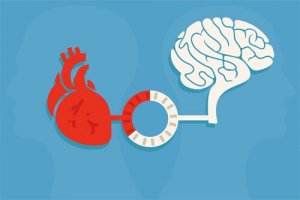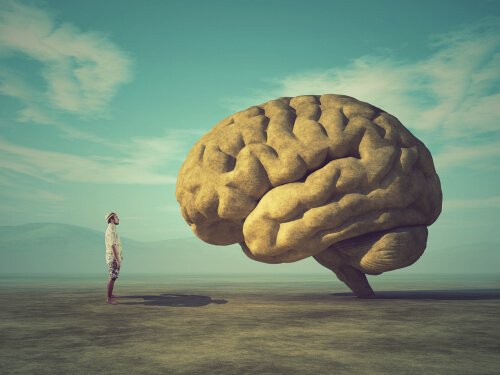Reason and Emotion: A Balance That Yields Good Decisions

Some people believe that the best decisions come from a place of reason. However, making decisions after we’ve set our emotions aside isn’t always effective or even possible. Making decisions purely with our emotions while forgetting reason isn’t a guarantee of good results either. Therefore, the best thing to do is to combine reason and emotion to make good decisions.
Finding a good balance between our rational and emotional sides is the key to making better decisions. At the same time, this balance results from life experience and a lot of past mistakes.
Therefore, maybe the first intelligent decision we can make is not putting reason and emotions against each other. If we think about it, on most occasions, the heart and the mind usually go the same way. However, separating reason and emotion is something we do all too often.

Do right decisions exist?
We all want to make the right decisions, the best ones. But what is a right decision? This is a hard question to answer. There are people who say that a right decision is the one that benefits us the most. However, this isn’t always crystal clear. If it was, everyone would choose the decision that was best for them regardless of the consequences they would have on other people.
For example, when we fall in love, emotions gain strength and tend to take over our decisions. When we fall in love, we somehow become blind and deaf. Is this what benefits us the most?
Emotions still influence our decisions, even when we’re not in love. The importance of emotions can be seen in brain injuries in the orbitofrontal cortex. This region plays a role in the functioning of the amygdala. The amygdala is also a part of our emotional system. Thus, patients who have injuries in the orbitofrontal cortex don’t make decisions with their emotions as much as normal people do.
Separating reason and emotion
What would we think of a person who made purely rational decisions? If we knew that a person only cared about themselves, we wouldn’t trust that person. However, we only want to trust rational people. Or not?
The truth is that empathy, the ability to perceive others’ emotions, is what makes us trust other people more than their rationality. We’ll trust people who are able to smile or become excited with us or become upset when something bad happens to us more than rational people.
We can see this in teenagers. During that stage, we tend to make decisions that involve great risks. That’s why adolescence is considered a very difficult stage where teenagers ignore their parents. The cause, or at least one of the causes, lies inside the prefrontal cortex of the brain.
The orbitofrontal cortex, which hasn’t fully matured, is in this part of the brain. Since it hasn’t matured, it doesn’t control emotions effectively yet. Therefore, decision making is influenced by emotions. Fortunately, the experiences in this life stage will make this part of the brain mature eventually.

The role of emotions in decision making
There seems to be a contradiction. We say that the best way to make decisions is to combine reason and emotion, but so far we’ve only talked about how emotions negatively affect us. To understand the role of emotions, it’s necessary to understand that they’re somatic markers.
Somatic markers are feelings that guide us when making decisions. These markers help us decide which option will be best for our interests, especially when we’re dealing with so many things we can’t decide what’s best. Somatic markers are also intuitions we’ve accumulated from past experiences. These intuitions warn us of potential consequences when we begin to ponder some decisions.
For example, if we walk down a street where we were robbed a long time ago, we’ll have the feeling that we should have walked down another street. These intuitions aren’t always conscious. Therefore, we may actually head down another street without knowing what made us do it.
Luckily, along with intuition comes rational processes which allow us to weigh the pros and cons. The duality between reason and emotion is what guides our decisions and what makes us move forward, keep our hope alive, and keep being who we are.
Some people believe that the best decisions come from a place of reason. However, making decisions after we’ve set our emotions aside isn’t always effective or even possible. Making decisions purely with our emotions while forgetting reason isn’t a guarantee of good results either. Therefore, the best thing to do is to combine reason and emotion to make good decisions.
Finding a good balance between our rational and emotional sides is the key to making better decisions. At the same time, this balance results from life experience and a lot of past mistakes.
Therefore, maybe the first intelligent decision we can make is not putting reason and emotions against each other. If we think about it, on most occasions, the heart and the mind usually go the same way. However, separating reason and emotion is something we do all too often.

Do right decisions exist?
We all want to make the right decisions, the best ones. But what is a right decision? This is a hard question to answer. There are people who say that a right decision is the one that benefits us the most. However, this isn’t always crystal clear. If it was, everyone would choose the decision that was best for them regardless of the consequences they would have on other people.
For example, when we fall in love, emotions gain strength and tend to take over our decisions. When we fall in love, we somehow become blind and deaf. Is this what benefits us the most?
Emotions still influence our decisions, even when we’re not in love. The importance of emotions can be seen in brain injuries in the orbitofrontal cortex. This region plays a role in the functioning of the amygdala. The amygdala is also a part of our emotional system. Thus, patients who have injuries in the orbitofrontal cortex don’t make decisions with their emotions as much as normal people do.
Separating reason and emotion
What would we think of a person who made purely rational decisions? If we knew that a person only cared about themselves, we wouldn’t trust that person. However, we only want to trust rational people. Or not?
The truth is that empathy, the ability to perceive others’ emotions, is what makes us trust other people more than their rationality. We’ll trust people who are able to smile or become excited with us or become upset when something bad happens to us more than rational people.
We can see this in teenagers. During that stage, we tend to make decisions that involve great risks. That’s why adolescence is considered a very difficult stage where teenagers ignore their parents. The cause, or at least one of the causes, lies inside the prefrontal cortex of the brain.
The orbitofrontal cortex, which hasn’t fully matured, is in this part of the brain. Since it hasn’t matured, it doesn’t control emotions effectively yet. Therefore, decision making is influenced by emotions. Fortunately, the experiences in this life stage will make this part of the brain mature eventually.

The role of emotions in decision making
There seems to be a contradiction. We say that the best way to make decisions is to combine reason and emotion, but so far we’ve only talked about how emotions negatively affect us. To understand the role of emotions, it’s necessary to understand that they’re somatic markers.
Somatic markers are feelings that guide us when making decisions. These markers help us decide which option will be best for our interests, especially when we’re dealing with so many things we can’t decide what’s best. Somatic markers are also intuitions we’ve accumulated from past experiences. These intuitions warn us of potential consequences when we begin to ponder some decisions.
For example, if we walk down a street where we were robbed a long time ago, we’ll have the feeling that we should have walked down another street. These intuitions aren’t always conscious. Therefore, we may actually head down another street without knowing what made us do it.
Luckily, along with intuition comes rational processes which allow us to weigh the pros and cons. The duality between reason and emotion is what guides our decisions and what makes us move forward, keep our hope alive, and keep being who we are.
This text is provided for informational purposes only and does not replace consultation with a professional. If in doubt, consult your specialist.







